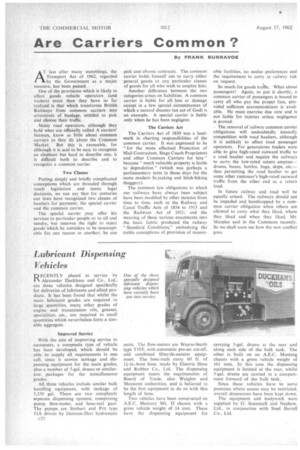Are Carriers Common ?
Page 52

If you've noticed an error in this article please click here to report it so we can fix it.
By FRANK BURRAVOE
AT last after many stumblings, the Transport Act of 1962, regarded by the Government as a major measure, has been passed.
One of the provisions which is likely to affect goods vehicle operators (and traders) more than they have so far realized is that which transforms British Railways from common carriers into aristocrats of haulage, entitled to pick and choose their traffic.
' Many road operators. although they hold what are officially called A carriers' licences, know as little about common carriers as they do about the Common Market. But this is excusable, for although it is said to be easy to recognize an elephant but hard to describe one, it is difficult both to describe and to recognize a common carrier.
Two Classes Putting simply and briefly complicated conceptions which are threaded through much legislation and many legal decisions, we can say that for centuries our laws have recognized two classes of hauliers for payment: the special carrier and the common carrier.
The special carrier may offer his services to particular people or to all and sundry, but reserves the right to reject goods which he considers to be unacceptable for one reason or another; he can pick and choose contracts. The common carrier holds himself out to carry either general goods or any particular classes of goods for all who wish to employ him.
Another difference between the two categories arises on liabilities. A common carrier is liable for all loss or damage except in a few special circumstances of which a natural disaster (an act of God) is an example. A special carrier is liable only when he has been negligent.
The Carriers Act The Carriers Act of 1830 was a landmark in charting responsibilities of the common carrier. It was expressed to be "for the more effectual Protection of Mail Contractors, Stage Coach Proprietors and other Common Carriers for hire" because "much valuable property is liable to depredation" (which was perhaps a parliamentary term in those days for the more modern hi-jacking and hitch-hiking thuggery).
The common law obligations to which our railways have always been subject have been modified by other statutes from time to time, such as the Railway and Canal Traffic Acts of 1854 to 1913 and the Railways Act of 1921; and the weaving of these various enactments into the basic fabric produced the railway "Standard Conditions," embodying the treble conceptions of provision of reason
able facilities, no undue preferences and the requirement to carry at railway risk On request.
So much for goods traffic. What about passengers? Again, to put it shortly, a common carrier of passengers is bound to carry all who pay the proper fare, provided sufficient accommodation is available. He must exercise due care and is not liable for injuries unless negligence is proved.
The removal of railway common carrier obligations will undoubtedly intensify competition with road hauliers, although it is unlikely to affect road passenger operators. For generations traders were able to give high-rated outward traffic to a road haulier and require the railways to carry the low-rated return empties— drums, boxes, bottles, hags, skips, etc.-thus permitting the road haulier to get some other customer's high-rated outward traffic from the other end as a return load.
In future railway and road will be equally armed, The railways should not be impeded and handicapped by a common carrier obligation when others are allowed to carry what they liked, where they liked and when they liked, Mr. Marples said in the Commons recently. So we shall soon see how the new conflict goes.












































































































